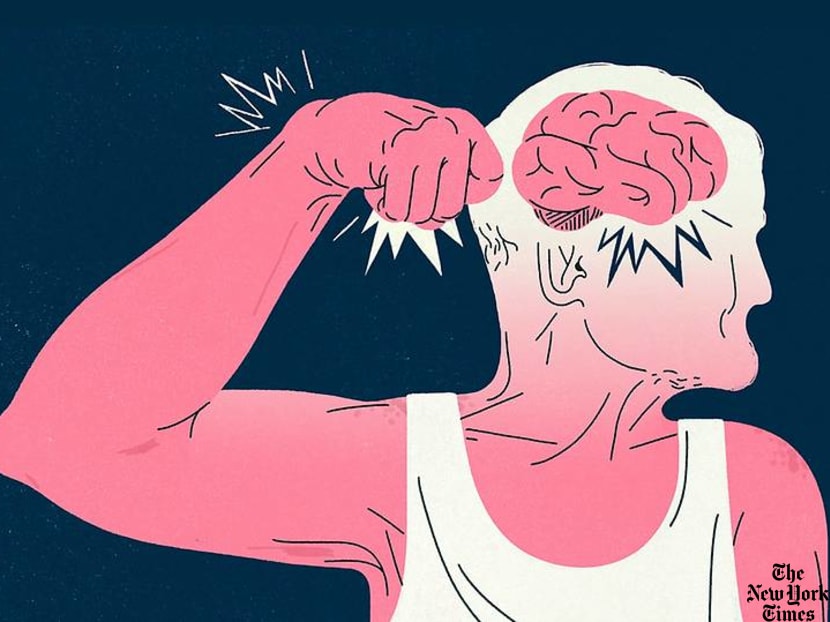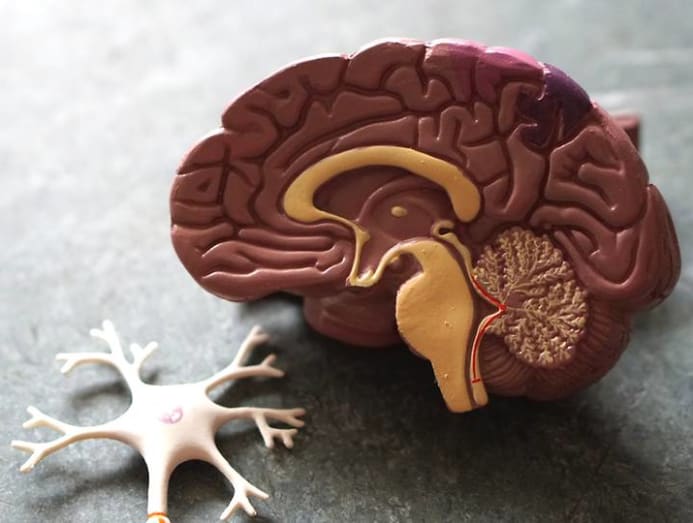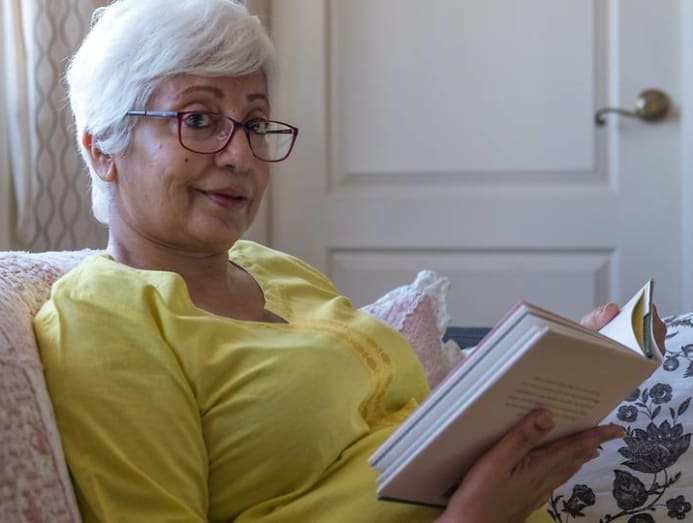The secrets of super-agers: How centenarians can help beat Alzheimer's disease
Advertisement
Wellness
The secrets of super-agers: How centenarians can aid beat out Alzheimer'southward illness
By studying centenarians, researchers hope to identify characteristics and develop treatments that would result in healthy cognitive ageing for most of us.

(Art: Gracia Lam/The New York Times)
1 of my greatest pleasures during the COVID-19 shutdowns was having the time to indulge in hour-long phone conversations with friends and family unit whom I could not run into in person. Especially uplifting were my bi-weekly talks with Margaret Shryer, a twice-widowed, 94-year-sometime Minneapolitan.
I met Margaret in Minneapolis in 1963, six months afterward her first husband was killed by a drunken driver. With 4 pocket-size children to support, this immature widow wasted no time getting qualified to teach German language to high school students. Margaret and I are kindred spirits who bonded instantly, and despite living one-half a land apart since 1965, we've remained devoted friends now for 58 years.
My conversations with Margaret are substantive and illuminating, covering topics that include politics, verse, plays and philosophy besides as family unit pleasures and problems. I relish her wisdom and sage advice. I especially delight in the fact that she seems not to have lost an iota of her youthful brain power. She's equally sharp now as she was when we first met decades ago.
READ: How to convince your stubborn mum and dad to go for a health cheque-upward
Recent findings about the trajectories of human cognition suggest that if no physical insult, like a stroke, intervenes in the next six years, Margaret is destined to be a cognitively sharp centenarian.
Fewer than i per cent of Americans reach the age of 100. New data from the Netherlands indicate that those who attain that milestone with their mental faculties intact are likely to remain then for their remaining years, even if their brains are riddled with the plaques and tangles that are the hallmarks of Alzheimer's affliction.

Findings from the Dutch study may somewhen pave a path for many more than of us to become "cerebral super-agers", as researchers call people who approach the end of the human life bridge with brains that function as if they were 30 years younger.
Ane day, everyone who is physically able to achieve 100 may also exist able to remain mentally healthy. By studying centenarians, researchers promise to place characteristics and develop treatments that would result in healthy cognitive ageing for most of us. Meanwhile, in that location is much we can do at present to proceed our brains in tiptop condition.
These hopeful prospects stem from the study of 340 Dutch centenarians living independently who were tested and shown to be cognitively salubrious when they enrolled. The 79 participants, who neither died nor dropped out of the study, returned for repeated cognitive testing, over an boilerplate follow-upwardly of 19 months.
Alzheimer'south disease is not an inevitable issue of ageing. Those genetically predisposed tin can markedly delay information technology or show no evidence of it before they dice past doing the things we know are healthful.
The research team, directed by Henne Holstege at Vrije University in Amsterdam, reported in JAMA Network Open up in January that these participants experienced no decline in major cerebral measures, except for a slight loss in memory function.
Basically, they performed as if they were xxx years younger in overall knowledge; ability to make decisions and plans, and execute them; recreate by drawing a effigy they had looked at; list animals or objects that began with a certain letter; and not becoming easily distracted when performing a task or getting lost when they left home.
Even those with genes linked to an elevated gamble of developing Alzheimer's affliction were able to perform well on the tests.

About a 3rd of the participants agreed to donate their brains subsequently expiry. Brain autopsies of 44 of the original centenarians revealed that many had substantial neuropathology mutual to people with Alzheimer'due south disease although they had remained cognitively salubrious for up to 4 years across 100.
Dr Thomas Perls, a geriatrician at Boston Academy, who directs the New England Centenarian Study and wrote an accompanying editorial, said that the Dutch participants represented "the creme de la creme" of centenarians who had averted the onset of Alzheimer's disease by at least 20 to thirty years. They seemed to be either resistant to the illness or cognitively resilient. Perhaps both.
In that location's a direct connection between hearing and preserving cognitive role. Hearing loss results in cognitive loss because you miss so much.
Resistance, Dr Perls explained, may reflect a relative absence of brain damage conferred by a person'southward genes or lifestyle. Or they may take "protective biological mechanisms that dull encephalon ageing and prevent clinical affliction", he said.
Resilience, on the other manus, characterises people with normal cognitive abilities even though their brains may have damage typical of Alzheimer's, the leading crusade of dementia. In addition to plaques and tangles, such changes include loss of neurons, inflammation and clogged claret vessels.
People with cognitive resilience are able to accrue "higher levels of brain harm before clinical symptoms appear", the Dutch squad reported.
READ: How to protect yourself against historic period-related muscle loss
Yaakov Stern, neuropsychologist and director of cognitive neuroscience at Columbia Academy College of Physicians and Surgeons, said that while resistant individuals might exist spared much of the brain pathology typical of Alzheimer's disease, resilient individuals have what researchers call a cognitive reserve that enables them to cope better with pathological changes.
Many studies take revealed that a diverseness of lifestyle factors may contribute to resilience, Dr Stern said. Amidst them are obtaining a college level and meliorate quality education; choosing occupations that deal with complex facts and information; consuming a Mediterranean-style diet; engaging in leisure activities; socialising with other people; and exercising regularly.

Dr Perls said: "Alzheimer's disease is not an inevitable upshot of ageing. Those genetically predisposed can markedly delay it or show no evidence of it before they dice by doing the things we know are healthful: Exercising regularly, maintaining a healthy weight, non smoking, minimising blood-red meat in the diet, and doing things that are cognitively new and challenging to the brain, similar learning a new linguistic communication or a musical instrument".
Also of import is to maintain good hearing, said Dr Perls, a 60-yr-old who wears a hearing aid. "I tin't emphasise enough how important information technology is for people to optimise their power to hear," he said.
"There's a directly connection betwixt hearing and preserving cognitive part. Beingness stubborn about wearing hearing aids is just featherbrained. Hearing loss results in cognitive loss because yous miss so much. You lot lose touch with your environs."
Vision, too, is of import, particularly for people who already are cognitively challenged. "Poor vision makes cognitive harm worse," Dr Perls said. As his brain-challenging action, he'southward taken upwards birding, which requires both good hearing and practiced vision.
For her role, my friend Margaret reads, writes and recites verse and occasionally acts in a relative's films.
By Jane Brody © The New York Times
This article originally appeared in The New York Times.
https://www.nytimes.com/2021/06/21/well/heed/aging-memory-centenarians.html
Recent Searches
Trending Topics
Source: https://cnalifestyle.channelnewsasia.com/wellness/cognitive-ageing-centenarians-alzheimers-disease-249321

0 Response to "The secrets of super-agers: How centenarians can help beat Alzheimer's disease"
Post a Comment